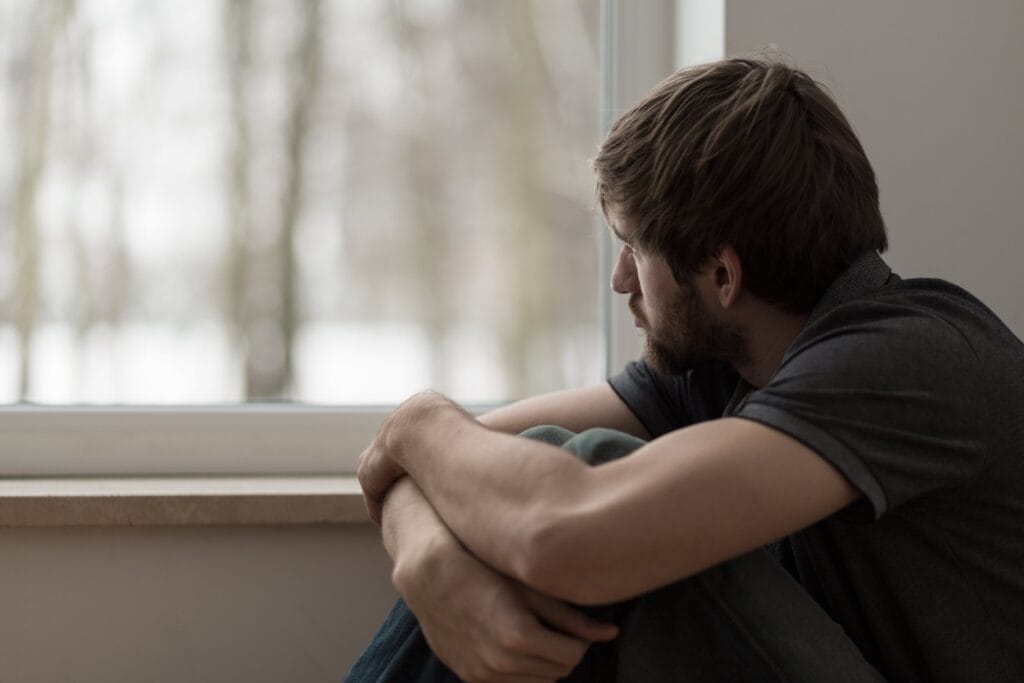Why Do I Feel Depressed for No Reason?

Depression without an apparent cause isn’t uncommon, but it can feel confusing and overwhelming. You may find yourself experiencing symptoms without an identifiable trigger. Unlike grief following a loss or sadness stemming from a specific event, depression can come from seemingly nowhere. Along with the depression symptoms themselves, you might also feel frustrated and confused by what you’re going through.
We’re a society that demands tangible reasons for emotional distress. Navigating depression that doesn’t have a cause can feel isolating. By shedding light on depression and its underlying causes and exploring treatment options, it becomes possible to gain more understanding and empathy for someone we love, or even for ourselves.
What Does Depression Feel Like?
A complicated, multifaceted experience, depression varies a lot between people. Even with these variations, there are commonalities often shared between people with depression.
Depression can include the following feelings and experiences:
- Persistent sadness or feelings of emptiness lasting for weeks, months, or potentially even years. Sadness isn’t tied to a specific circumstance or event but can feel like it permeates different aspects of life.
- A loss of interest or sense of apathy, including towards activities you once enjoyed. Socializing, work, hobbies, and even your relationships can lose appeal. The result can be feelings of detachment from the world around you.
- Low energy and fatigue can come with depression. The symptoms can feel like constant exhaustion, mentally and physically, regardless of how much rest you get. Even simple daily tasks can drain and overwhelm you. You may find it challenging to have the energy or motivation to engage in everyday activities.
- Difficulty concentrating and mental fog can make it hard to make decisions, focus and remember things. When you have depression, cognitive impairment can negatively affect your work or school performance and worsen feelings of inadequacy or frustration.
- Depression symptoms include appetite and weight changes, such as weight gain or loss. Some people who are struggling with depression might lose their interest in food and eating. Others might try to find comfort through eating.
- Sleep disturbances such as oversleeping or insomnia are depression symptoms.
- Feelings of guilt or worthlessness are everyday experiences with depression. You might have a sense of self-doubt or harshly criticize yourself. These feelings can become a negative cycle of emotions and thoughts.
- It’s not uncommon to have unexplained physical symptoms when you’re dealing with depression, like muscle pain, headaches, or stomach aches.
- Social withdrawal or isolation can stem from embarrassment, shame, or the belief that others won’t understand what you’re going through.
- In severe cases, depression can cause thoughts about self-harm or suicide.
When you’re going through these feelings, it’s vital to realize depression is a severe mental condition. It can profoundly affect every aspect of your life.
Why Does Depression Happen?
You may feel as if you’re depressed for no reason, but it can occur because of complex circumstances. You might experience it without an apparent external trigger, but it could stem from biological, psychological, or environmental factors.
- Brain chemistry changes can play a role in the development of depression. You might have an imbalance in neurotransmitters or abnormalities in your brain’s function and structure.
- Genetics can predispose you to depression because it often runs in families.
- Psychological factors like personality traits, thought patterns, and coping styles can lead to depression. If you tend towards negative thinking or have a history of trauma or abuse, for example, you could be at a higher risk of developing depression.
- Environmental factors like loneliness, violence exposure, a lack of social support or discrimination can lead to depression.
- Medical conditions, including hormonal imbalances, chronic pain and chronic illnesses, can contribute to depression development. You may find the emotional and physical burden that comes with managing a medical condition takes a toll on your mental health, raising your vulnerability to depression.
- Substance abuse and dependence also frequently contribute to depression’s development or the worsening of symptoms. Drugs and alcohol might temporarily provide a reprieve from distressing symptoms but then end up making things worse.
While it might feel like you’re experiencing depression for no reason, in reality, there are underlying reasons that you’re probably having symptoms and feeling the way you are.
How Is Depression Different from Sadness and Grief?
Depression, grief, and sadness are all distinct emotional experiences, but they do overlap in many cases. Some of the ways these differ from one another include:
Persistence
Sadness is usually a transient emotion. It comes up in response to a specific situation or event, and over time, it gets better as you process your emotions and adapt to the circumstances.
Grief is a natural, typical response to loss, and it can involve intense feelings of sadness. Grief also tends to be a process happening over time, but it does diminish gradually as you adjust to life without the person or thing you lose.
Depression is persistent and usually not tied to a specific trigger or event. Rather than getting better over time, without treatment, it may worsen and impact functioning in different aspects of your life.
Intensity
Sadness includes feelings of regret or disappointment, but it doesn’t feel as deep and pervasive as depression. The intensity of sadness may fluctuate, and you may feel better doing certain activities.
Grief encompasses many emotions, which may be overwhelming initially, but the intensity lessens over time and becomes more manageable.
Depression is characterized by deep pain and despair, usually affecting every area of life. It feels unrelenting and like you can’t overcome it, no matter the circumstances.
Symptoms
Sadness can come with physical symptoms like changes in appetite or fatigue, but they’re usually transient and get better as your emotional state improves.
Symptoms of grief might include fatigue, concentration problems and sleep disturbances, but again, these are usually shorter-term and more transient than what’s associated with depression.
Depression symptoms can go well beyond sadness, and they’re severe and pervasive for many people.
What Should You Do If You’re Experiencing Depression for No Reason?
Experiencing depression without an apparent reason can be overwhelming and confusing, but there are steps to take to cope and get support. These steps include:
- Acknowledge your feelings and recognize that your experience is valid, even if you can’t pinpoint a specific cause. Depression is a legitimate condition that can affect anyone, no matter their external circumstances.
- Reach out for support from people you care about or a mental health professional. Sharing your feelings can provide comfort and validation, and you can receive assistance to find help.
- Seek professional help. An experienced mental health provider or treatment center can perform a comprehensive evaluation and offer appropriate treatment options. Therapy, medication, or a combination of these may help you manage your depression symptoms, facilitating recovery.
- Practice self-care
- Establish daily routines that include goals and structured activities. Having a sense of purpose can motivate and boost self-esteem.
- Limit your exposure to stressors, triggers, or negative influences.
- Enroll in our 45-day mental health residential program. Our 45-day depression mental health program provides a safe, supportive, and structured environment that prepares you to transition back into your daily life when treatment is complete. Our integrative approach to the treatment of depression ensures that your needs are met in all ways, physically and mentally. We don’t just treat symptoms — our plans integrate traditional, holistic, and naturopathic approaches for sustained depression recovery.
Finally, be kind to yourself and be patient. It’s okay to experience setbacks during the process of recovering from depression.
If you’d like to learn about professional mental health, contact us at Midwest Recovery Centers. We offer primary mental health programs and dual diagnosis treatment for mental health conditions that occur along with addiction.



